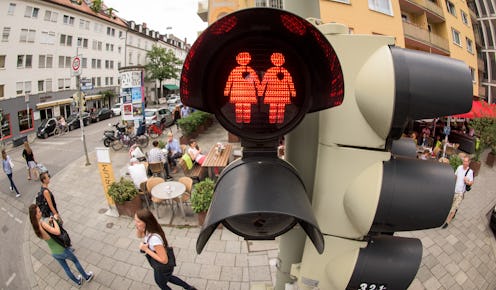News
Australia Is Trying Female Traffic Light Icons

The city of Melbourne, Australia, is introducing a subtle new social experiment to combat sexism, but it's already being denigrated before it's even put in place. Ten new pedestrian crosswalk signals featuring female figures will be installed in some of the city's busiest intersections as part of an initiative to “reduce unconscious bias” and promote equal representation of men and women, according to the Committee of Melbourne, a non-profit organization made up of more than 120 community groups and businesses.
Immediately, the backlash to the new plan started to pour in, both from government officials and online commentators. The lord mayor of Melbourne told the local newspaper The Herald Sun that he thinks "this sort of costly exercise is more likely to bring derision.” However, according to The Guardian, a Melbourne electric company donated the new lights, so there won't be any cost to the community.
Others argued that the move was unnecessary because the male figures don't contribute to systemic sexism, but the backlash seems to suggest otherwise. "Yep, the 1st thing I taught my son was that the pedestrian crossing symbols were a direct [message] that men were superior to women," Australian footballer Scotty Cummings tweeted in response to the news. One man launched into an (admittedly hilarious) profanity laden tirade about the new lights. Infamously anti-feminist television personality Piers Morgan tweeted a link to an article with just the caption "sigh."
A spokesperson for the committee told The Guardian that the lights may be left in place longer than their 12-month trial period, if “the risk assessment [is] positive," but there might actually be evidence that it won't be. People tend to take things named after women less seriously — multiple studies have shown that hurricanes with feminine names are taken less seriously and have a higher death rate than hurricanes with masculine names. Will people unconsciously take the new female crossing signs less seriously and take less precaution around the busy intersections?
That lack of respect for feminine symbols in and of itself exposes the existence of a problem. Women shouldn't be taken less seriously than men in any context, whether it be a boardroom or a crosswalk. The fact that many people, quite often men, were so quick to attack the new initiative also highlights a disparity. If the street lights weren't that important to start with, there should be no reason that they are attracting so much criticism. Intense disparagement of something like a traffic light will only perpetuate the social divide between social progressives and social conservatives — in this case, the opponents should calm down and give the initiative a chance before proclaiming it a failure.
Melbourne isn't the first place to experiment with changing its streetlights — In 2014, Germany mandated equal representation of masculine and feminine figures on its crossing signs. Since Germany hasn't seen a massive spike in pedestrian deaths, it's quite likely that the citizens of Melbourne will be just fine.
This incident shows how difficult it can be to combat sexism in society, because people often attack you just for trying. Ultimately, all symbols used in a social context need to be critically examined, and while this certainly isn't the end of the war against sexism, it's a step forward instead of a stagnation.